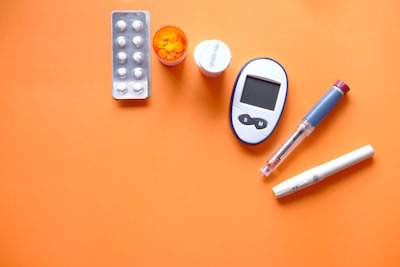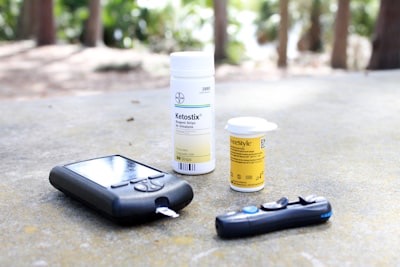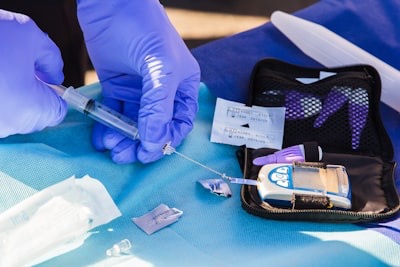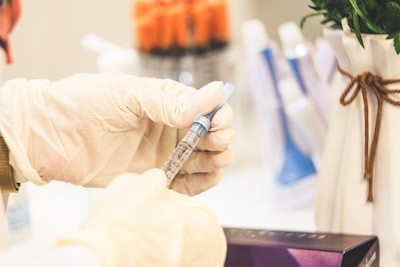Diabetes Best Treatments: Medications and Therapies

Key Highlights
- Medications and therapies play a crucial role in managing diabetes and controlling blood sugar levels.
- The type of medication prescribed depends on the type of diabetes and individual needs.
- Insulin is the most common medication used for type 1 diabetes, while oral medications are typically prescribed for type 2 diabetes.
- Lifestyle modifications such as diet and exercise are important components of diabetes management.
- Advanced treatment options, such as bariatric surgery and insulin delivery systems, are available for those who need additional support.
- Technology, including mobile apps and artificial pancreas systems, is revolutionizing diabetes management.
Introduction

Diabetes is a chronic condition that affects millions of people worldwide. It occurs when the body cannot properly regulate blood sugar levels, leading to high levels of glucose in the blood. If left untreated or poorly managed, diabetes can lead to serious complications such as heart disease, kidney disease, and nerve damage. One potential side effect of diabetes medications is low blood glucose, also known as hypoglycemia. It is important to understand the potential side effects of your diabetes medicine and how to manage them to ensure proper treatment.
The key to managing diabetes lies in a combination of medications, therapies, and lifestyle modifications. Medications, such as diabetes medicine, are an essential part of treatment for both type 1 and type 2 diabetes. They help regulate blood sugar levels and prevent complications. In addition to medications, lifestyle modifications, including a healthy diet and regular exercise, are crucial for managing diabetes.
This blog will discuss the various medications and therapies available for treating diabetes. We will explore the different types of diabetes, the diagnosis strategies, and the role of medications in managing the condition. We will also delve into lifestyle modifications, advanced treatment options, and the role of technology in diabetes management. Whether you have been recently diagnosed with diabetes or have been living with the condition for years, this blog will provide valuable information on the best treatments available for managing diabetes.
Understanding Diabetes and Its Types

Diabetes is a chronic metabolic disorder characterized by high blood sugar levels. There are several types of diabetes, including type 1 diabetes, type 2 diabetes, and gestational diabetes.
Type 1 diabetes is an autoimmune disease where the body’s immune system mistakenly attacks and destroys the insulin-producing cells in the pancreas. This type of diabetes is usually diagnosed in children and young adults.
Type 2 diabetes is the most common form of diabetes. It occurs when the body becomes resistant to insulin or doesn’t produce enough insulin to regulate blood sugar levels. Risk factors for type 2 diabetes include obesity, sedentary lifestyle, family history, and certain ethnicities.
Gestational diabetes occurs during pregnancy and affects about 7% of pregnant women. It usually resolves after childbirth, but women with gestational diabetes are at a higher risk of developing type 2 diabetes later in life.
Overview of Type 1 and Type 2 Diabetes

Type 1 diabetes is an autoimmune disease where the body’s immune system mistakenly attacks and destroys the insulin-producing cells in the pancreas. As a result, the body cannot produce insulin, which is necessary for regulating blood sugar levels. People with type 1 diabetes require insulin injections or the use of an insulin pump to manage their blood sugar levels.
Type 2 diabetes occurs when the body becomes resistant to insulin or doesn’t produce enough insulin to regulate blood sugar levels effectively. Risk factors for type 2 diabetes include obesity, sedentary lifestyle, family history, and certain ethnicities. Lifestyle modifications, including a healthy diet and regular exercise, are important for managing type 2 diabetes. In some cases, oral medications or insulin therapy may be necessary to control blood sugar levels.
Maintaining a healthy body weight is important for both types of diabetes. Excess body weight can contribute to insulin resistance and make it more challenging to manage blood sugar levels. Developing healthy habits, such as regular physical activity and a balanced diet, can help prevent and manage both type 1 and type 2 diabetes by keeping blood sugar levels within a healthy range.
Identifying Prediabetes and Gestational Diabetes
Prediabetes is a condition where blood glucose levels are higher than normal but not high enough to be diagnosed as type 2 diabetes. It is often a precursor to type 2 diabetes and serves as a warning sign to make lifestyle changes to prevent or delay the onset of diabetes.
Gestational diabetes occurs during pregnancy and affects about 7% of pregnant women. It usually develops around the 24th week of pregnancy and is caused by hormonal changes that affect insulin production and utilization. Gestational diabetes increases the risk of complications during pregnancy and delivery and can also increase the risk of developing type 2 diabetes later in life. Regular monitoring of blood glucose levels and following a healthy eating plan and physical activity regimen are essential for managing gestational diabetes and ensuring a healthy pregnancy.
Comprehensive Diagnosis Strategies

Diagnosing diabetes involves several strategies to assess blood glucose levels and determine the type and severity of the condition.
Blood glucose testing is the primary tool for diagnosing diabetes. This can be done through a fasting plasma glucose test, oral glucose tolerance test, or random plasma glucose test. These tests measure blood sugar levels at different times and under different conditions to provide a comprehensive view of blood glucose control.
Another diagnostic tool is the A1C test, which measures average blood glucose levels over the past 2-3 months. This test is typically used to monitor long-term blood sugar control in individuals with known diabetes but can also be used in the diagnosis of the condition.
Diagnosis strategies may also involve assessing symptoms, medical history, and risk factors associated with diabetes. It is important to consult with a healthcare professional for an accurate diagnosis and appropriate treatment plan.
Blood Glucose Testing and Monitoring

Blood glucose testing is a crucial aspect of diabetes management. It allows individuals to monitor their blood sugar levels and make necessary adjustments to maintain optimal control.
There are various methods for blood glucose testing, including fingerstick testing, continuous glucose monitoring (CGM), and flash glucose monitoring. Fingerstick testing involves pricking the finger with a lancet to obtain a small blood sample, which is then analyzed using a glucose meter. CGM systems use a small sensor inserted under the skin to measure blood glucose levels continuously throughout the day, making it a valuable tool in clinical trials for diabetes treatments. Flash glucose monitoring involves scanning a sensor worn on the skin with a reader device to obtain glucose readings.
The target range for blood glucose levels may vary depending on individual circumstances, such as age, overall health, and presence of other medical conditions. However, generally, the target range for fasting blood sugar levels is between 80-130 mg/dL, and for post-meal blood sugar levels, it is below 180 mg/dL. Regular blood glucose monitoring and maintaining blood sugar within the target range are essential for effective diabetes management.
The Role of A1C in Diabetes Diagnosis
The A1C test is a valuable tool in diagnosing and monitoring diabetes. It measures the average blood glucose levels over the past 2-3 months by assessing the percentage of glycated hemoglobin in the blood.
The A1C test is typically used to monitor long-term blood sugar control in individuals with known diabetes. It is also used in the diagnosis of diabetes, especially in cases where fasting plasma glucose or oral glucose tolerance tests may not be feasible or accurate.
A1C levels provide valuable information about overall blood glucose control, and the target A1C level for most individuals with diabetes is below 7%. However, target levels may vary based on individual factors such as age, health conditions, and the presence of diabetes-related complications. Regular monitoring of A1C levels allows healthcare professionals to assess the effectiveness of treatment plans and make necessary adjustments to manage diabetes effectively.
Medications for Managing Diabetes
Medications play a crucial role in managing diabetes and controlling blood sugar levels. The type of medication prescribed depends on the type of diabetes and individual needs.
For individuals with type 1 diabetes, insulin is the primary medication used. It is administered either through injections or an insulin pump. Different types of insulin are available, including rapid-acting, short-acting, intermediate-acting, long-acting, and premixed insulin.
For individuals with type 2 diabetes, various oral medications are available, including biguanides, sulfonylureas, thiazolidinediones, dipeptidyl peptidase-4 (DPP-4) inhibitors, sodium-glucose transport protein 2 (SGLT2) inhibitors, and glucagon-like peptide-1 (GLP-1) receptor agonists. These medications work in different ways to regulate blood sugar levels and manage potential complications, such as heart failure. In fact, research has shown that GLP-1 agonists and SGLT-2 inhibitors can actually reduce the risk of cardiovascular events in patients with type 2 diabetes. In some cases, insulin therapy may also be necessary.
It is important to note that all medications can have side effects. Common side effects of diabetes medications include hypoglycemia (low blood sugar), upset stomach, and weight gain. It is essential to discuss potential side effects with a healthcare professional and follow the prescribed medication regimen.
Insulin Therapy Explained

Insulin therapy is a critical component of managing type 1 diabetes and may also be necessary for some individuals with type 2 diabetes. Insulin is a hormone that helps regulate blood sugar levels by facilitating the uptake of glucose into cells.
There are different types of insulin available for therapy, including rapid-acting, short-acting, intermediate-acting, long-acting, and premixed insulin. The choice of insulin type depends on individual needs and blood sugar control requirements.
Insulin can be administered through injections using a needle and syringe, an insulin pen, or an insulin pump. Insulin pumps are small devices that deliver a continuous supply of insulin throughout the day. They can be programmed to deliver precise doses of insulin based on individual needs. Insulin pump therapy offers greater flexibility and convenience for individuals with diabetes who require much insulin.
Oral Medications for Type 2 Diabetes
Oral medications are commonly used in the management of type 2 diabetes. These medications work by various mechanisms to help regulate blood sugar levels.
Biguanides, such as metformin, decrease the production of glucose by the liver and increase the body’s sensitivity to insulin. Sulfonylureas stimulate the pancreas to produce more insulin. Thiazolidinediones improve insulin sensitivity in muscle and fat cells. Dipeptidyl peptidase-4 (DPP-4) inhibitors increase insulin release and decrease glucagon secretion. Sodium-glucose transport protein 2 (SGLT2) inhibitors prevent the reabsorption of glucose by the kidneys, leading to increased glucose excretion in urine. Glucagon-like peptide-1 (GLP-1) receptor agonists mimic the action of GLP-1, a hormone that stimulates insulin secretion. These oral medications are commonly used in the United States to treat type 2 diabetes.
The choice of oral medication depends on various factors, including individual needs, medical history, and potential side effects. It is important to consult with a healthcare professional to determine the most appropriate oral medication for managing type 2 diabetes.
Advanced Treatment Options
In addition to medication and lifestyle modifications, advanced treatment options are available for individuals with diabetes who require additional support.
Bariatric surgery, also known as weight loss surgery, is an option for individuals with type 2 diabetes who have obesity. It can help promote significant weight loss and improve blood sugar control. Bariatric surgery works by altering the digestive system to limit food intake and nutrient absorption.
Insulin delivery systems, such as insulin pens and insulin pumps, offer more precise and convenient insulin administration for individuals with diabetes. Insulin pens are pen-like devices that allow for easy and accurate insulin dosing. Insulin pumps are small devices that continuously deliver insulin throughout the day, eliminating the need for multiple daily injections. These advanced treatment options have been approved by the Food and Drug Administration for use in managing type 1 diabetes.
These advanced treatment options provide additional tools for managing diabetes and can significantly improve blood sugar control and overall quality of life for individuals with diabetes.
Latest in Insulin Delivery Systems
Insulin delivery systems have evolved significantly in recent years, offering improved convenience and accuracy in insulin administration for individuals with diabetes.
Insulin pens are pen-like devices that allow for easy and accurate insulin dosing. They come pre-filled with insulin cartridges and are disposable, making them a convenient option for individuals who require frequent insulin injections. Insulin pens are portable, discreet, and eliminate the need for vials and syringes.
Insulin pumps are small devices that deliver a continuous supply of insulin throughout the day. They consist of a pump device and a thin tube connected to a small needle that is inserted under the skin. Insulin pumps can be programmed to deliver precise doses of insulin based on individual needs, offering greater flexibility in insulin dosing.
These advancements in insulin delivery systems have made insulin administration more convenient and discreet for individuals with diabetes, leading to improved adherence to treatment regimens and better blood sugar control.
Breakthroughs in Continuous Glucose Monitors (CGMs)
Continuous glucose monitors (CGMs) are innovative devices that provide real-time monitoring of blood glucose levels, offering valuable insights into glucose patterns and trends.
CGMs consist of a small sensor inserted under the skin that measures glucose levels in the interstitial fluid. The sensor wirelessly transmits glucose readings to a receiver or smartphone app, allowing individuals to monitor their blood sugar levels continuously throughout the day.
CGMs provide a wealth of data, including glucose trends, patterns, and alerts for high or low blood sugar levels. This information helps individuals make informed decisions about insulin dosing, diet, and physical activity to maintain optimal blood sugar control.
By providing real-time glucose readings and trend information, CGMs empower individuals with diabetes to make proactive adjustments to their diabetes management and reduce the risk of complications associated with high or low blood sugar levels.
Lifestyle Modifications and Their Impact
Lifestyle modifications are an essential component of diabetes management and can significantly impact blood sugar control and overall well-being.
Regular physical activity plays a crucial role in diabetes management. Exercise helps improve insulin sensitivity, lowers blood sugar levels, and can aid in weight management. Engaging in aerobic exercises, strength training, and flexibility exercises can all contribute to better blood sugar control.
A healthy diet is also key to managing diabetes. Consuming a balanced diet that includes a variety of fruits, vegetables, whole grains, lean proteins, and healthy fats can help regulate blood sugar levels and maintain a healthy weight.
Making lifestyle changes such as increasing physical activity and adopting a healthy diet can improve blood sugar control, reduce the risk of diabetes-related complications, and enhance overall quality of life for individuals with diabetes.
Diet and Nutritional Planning

Diet and nutritional planning are crucial for managing diabetes and achieving optimal blood sugar control. A well-balanced diet, also known as a diabetes diet, can help regulate blood sugar levels and maintain a healthy weight. Consulting with a registered dietitian can provide valuable guidance in developing an individualized meal plan based on specific dietary needs and preferences.
Key dietary considerations for individuals with diabetes include:
- Carbohydrate counting: Monitoring and controlling carbohydrate intake to manage blood sugar levels.
- Portion control: Eating appropriate portion sizes to prevent overeating and maintain blood sugar control.
- Glycemic index: Choosing foods with a low glycemic index to minimize blood sugar spikes.
- Balanced meals: Including a combination of carbohydrates, proteins, and fats to promote stable blood sugar levels.
- Fiber intake: Consuming adequate fiber from fruits, vegetables, and whole grains to aid digestion and regulate blood sugar levels.
Working with a registered dietitian can help individuals with diabetes effectively navigate dietary choices and make informed decisions that support blood sugar control and overall health.
Exercise as a Cornerstone of Diabetes Management
Regular exercise is a cornerstone of diabetes management and plays a vital role in blood sugar control and overall health. Physical activity helps improve insulin sensitivity, allowing the body to use insulin more efficiently and maintain stable blood sugar levels.
Key benefits of exercise for individuals with diabetes include:
- Lowering blood sugar levels: Physical activity helps muscles utilize glucose for energy, leading to decreased blood sugar levels.
- Improving insulin sensitivity: Exercise enhances the body’s ability to use insulin effectively, improving blood sugar control.
- Weight management: Regular exercise can aid in weight loss or weight maintenance, reducing the risk of obesity-related complications.
- Cardiovascular health: Exercise strengthens the heart and improves cardiovascular function, reducing the risk of heart disease, a common complication of diabetes.
Engaging in a variety of physical activities, including aerobic exercises, strength training, and flexibility exercises, can help individuals with diabetes achieve optimal blood sugar control and improve overall well-being.
Alternative Therapies in Diabetes Care
In addition to conventional medications and lifestyle modifications, some individuals with diabetes may explore alternative therapies to complement their diabetes care.
Alternative therapies in diabetes care include:
- Herbal and natural supplements: Certain herbal supplements, such as cinnamon, bitter melon, and fenugreek, have been studied for their potential benefits in blood sugar control. It is important to consult with a healthcare professional before using herbal supplements.
- Acupuncture and mind-body therapies: Acupuncture, meditation, and relaxation techniques have been explored as adjunct therapies for diabetes management. These practices may help reduce stress, improve overall well-being, and support blood sugar control.
While alternative therapies may offer additional support in diabetes care, it is essential to discuss their use with a healthcare professional to ensure their safety and effectiveness in each individual case.
Herbal and Natural Supplements
Herbal and natural supplements are commonly used by individuals with diabetes as adjunct therapies to help manage blood sugar levels. While some supplements may have potential benefits, it is important to consult with a healthcare professional before incorporating them into a diabetes management plan.
Some herbal and natural supplements that have been studied for their potential effects on blood sugar control include:
- Cinnamon: Some studies suggest that cinnamon may help improve blood sugar control by enhancing insulin sensitivity and slowing down the digestion of carbohydrates.
- Bitter melon: Bitter melon has been traditionally used in Ayurvedic medicine for its potential antidiabetic properties. It may help regulate blood sugar levels by increasing insulin secretion and improving glucose utilization.
- Fenugreek: Fenugreek seeds have been shown to have potential antidiabetic effects by improving insulin sensitivity and reducing fasting blood sugar levels.
It is important to note that while these supplements may offer potential benefits, they should not replace conventional diabetes treatments. It is crucial to discuss their use with a healthcare professional to ensure they are safe and effective for individual circumstances.
Acupuncture and Mind-Body Therapies
Acupuncture and mind-body therapies have gained popularity as alternative therapies for managing diabetes and promoting overall well-being. While research on these therapies is ongoing, they may offer potential benefits in supporting blood sugar control and stress management.
Acupuncture is a traditional Chinese medicine practice that involves the insertion of thin needles into specific points on the body. Some studies suggest that acupuncture may help improve insulin sensitivity, reduce inflammation, and promote relaxation, which can contribute to better blood sugar control.
Mind-body therapies, such as meditation, yoga, and relaxation techniques, focus on the connection between the mind and body. These practices may help reduce stress, improve mental health, and enhance overall well-being, which can positively impact blood sugar control.
While alternative therapies can complement conventional diabetes care, it is important to consult with a healthcare professional to ensure their safe and appropriate use in individual cases.
Managing Diabetes Complications
Managing diabetes complications is an essential aspect of diabetes care. Proper management can help prevent or delay the onset of complications and improve overall health outcomes.
Common complications associated with diabetes include:
- Cardiovascular disease: Individuals with diabetes are at an increased risk of developing heart disease, including heart attacks and strokes. Managing blood pressure, cholesterol levels, and blood sugar control is crucial for cardiovascular health.
- Kidney disease: Diabetes can damage the kidneys over time, leading to kidney disease or even kidney failure. Regular monitoring of kidney function and blood pressure, along with maintaining good blood sugar control, is important for kidney health.
Regular medical check-ups, adherence to prescribed medications, lifestyle modifications, and ongoing management of blood sugar levels are essential components of preventing and managing diabetes complications.
Monitoring for and Preventing Common Complications
Monitoring for and preventing common complications associated with diabetes is crucial for maintaining good health and preventing long-term damage.
Regular medical check-ups and screenings are essential for monitoring and detecting early signs of complications. These screenings may include:
- Regular blood pressure checks to monitor cardiovascular health.
- Kidney function tests, such as urine tests and blood tests, to assess kidney health.
- Eye exams to detect signs of diabetic retinopathy, a complication that affects the eyes.
Preventing complications involves effectively managing blood sugar levels, maintaining a healthy lifestyle, and adhering to prescribed medications. Lifestyle modifications, such as regular exercise, a healthy diet, and stress management, can positively impact cardiovascular health and reduce the risk of complications. Regular communication with healthcare professionals and following their recommendations, as outlined by the American Diabetes Association, is crucial for preventing and managing diabetes complications.
Addressing Cardiovascular Health in Diabetics
Addressing cardiovascular health is vital for individuals with diabetes, as they are at an increased risk of developing heart disease.
Controlling high blood pressure is crucial for cardiovascular health. Regular monitoring of blood pressure levels, adherence to prescribed medications, and lifestyle modifications, such as a healthy diet and regular exercise, can help manage blood pressure.
Maintaining healthy cholesterol levels is also important. High levels of LDL cholesterol (known as “bad” cholesterol) and low levels of HDL cholesterol (known as “good” cholesterol) can increase the risk of heart disease. Lifestyle modifications, such as consuming a heart-healthy diet and engaging in regular physical activity, along with prescribed medications if necessary, can help manage cholesterol levels.
Regular check-ups with healthcare professionals, adherence to prescribed medications, and lifestyle modifications are key to addressing cardiovascular health in individuals with diabetes and reducing the risk of heart disease.
Technology’s Role in Diabetes Management
Technology has revolutionized diabetes management, offering new tools and resources for individuals with diabetes to monitor their condition and manage blood sugar levels effectively.
Mobile apps and digital health tools provide convenient ways to track blood sugar levels, monitor medication usage, and record diet and exercise information. These tools can help individuals gain insights into their diabetes management and make informed decisions about their care.
Artificial pancreas systems, also known as closed-loop systems, combine insulin pumps and continuous glucose monitors to automate insulin delivery based on real-time glucose readings. These systems can help individuals achieve better blood sugar control with reduced manual intervention, leading to improved quality of life and peace of mind.
Embracing technology can enhance diabetes management and empower individuals to take a proactive approach to their health.
Mobile Apps and Digital Health Tools
Mobile apps and digital health tools have transformed diabetes management, providing individuals with a wealth of resources and information at their fingertips.
Mobile apps designed specifically for diabetes management offer features such as blood sugar tracking, medication reminders, food and nutrition logging, and access to educational resources. These apps can help individuals monitor their blood sugar levels, track medication usage, and make informed decisions about their diet and exercise regimens.
Digital health tools, such as online portals and websites, provide valuable resources and information for individuals with diabetes. These platforms offer educational materials, community support, and access to healthcare professionals for guidance and support.
By leveraging mobile apps and digital health tools, individuals with diabetes can take an active role in managing their condition and gain valuable insights into their diabetes management for improved blood sugar control and overall well-being.
The Future of Artificial Pancreas Systems
Artificial pancreas systems, also known as closed-loop systems, represent the future of diabetes care and management. These systems combine insulin pumps and continuous glucose monitors to automate insulin delivery based on real-time glucose readings.
The goal of artificial pancreas systems is to mimic the function of the pancreas, which regulates blood sugar levels by releasing insulin as needed. These systems provide individuals with diabetes with precise and automated insulin delivery, reducing the need for frequent manual intervention.
Ongoing research and development in artificial pancreas systems aim to improve the accuracy and reliability of glucose sensing and insulin delivery. The future of these systems holds the potential for more advanced algorithms, improved integration with mobile apps and digital health tools, and enhanced user experience.
Artificial pancreas systems offer a promising future for individuals with diabetes, providing them with better blood sugar control, increased convenience, and improved quality of life.
Conclusion
In conclusion, managing diabetes involves a combination of medications, lifestyle modifications, and advanced treatment options. It is crucial to monitor blood glucose levels regularly and explore alternative therapies for holistic care. Embracing technology, such as mobile apps and artificial pancreas systems, can also enhance diabetes management. By understanding the types of diabetes, early diagnosis, and proactive measures to prevent complications, individuals can lead a fulfilling life while effectively managing their condition. Remember, making informed decisions about your treatment plan and seeking guidance from healthcare professionals are key steps towards living well with diabetes.
Frequently Asked Questions
What are the first steps after a diabetes best treatments?
After a diabetes diagnosis, it is important to seek medical care from a healthcare provider experienced in diabetes management. They will help develop a treatment plan tailored to individual needs, which may include medication, lifestyle modifications, and regular monitoring of blood sugar levels.
How can I choose the right diabetes treatment plan?
Choosing the right diabetes treatment plan involves consulting with a healthcare professional who specializes in diabetes management. They will assess individual needs, consider treatment options, and guide decisions on medication, lifestyle modifications, and other therapies to achieve optimal blood sugar control.
hhttps://www.qxmd.com/r/21270185
https://www.ncbi.nlm.nih.gov/pmc/articles/PMC6484814
https://www.cdc.gov/diabetes/data/statistics-report/index.html
https://pubmed.ncbi.nlm.nih.gov/31063571
https://www.sciencedirect.com/science/article/pii/S1056872722000253